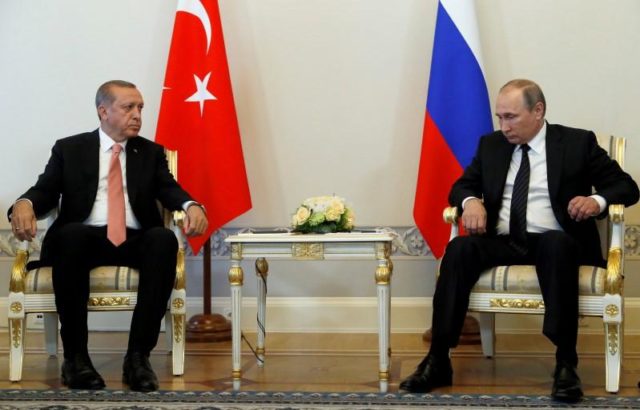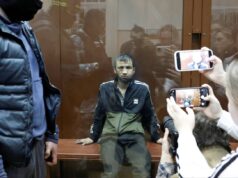
Turkish President Recep Tayyip Erdogan visited Russian President Vladimir Putin in St. Petersburg, Russia on August 9, in an effort to rebuild relations between the two countries. The visit was Erdogan’s first foreign meeting since the failed military overthrow in mid-July.
Erdogan took the opportunity to thank Putin for his support following the coup attempt, and heralded the meeting as the start of a “very different period” in Russian-Turkish relations. Talks of re-booting economic ties factored heavily into the discussion, as Putin said he will lift import sanctions and restore tourism charter flights with Turkey. Erdogan discussed energy, citing the potential to construct a natural gas pipeline between the two nations running under the Black Sea.
The Syrian civil war and other regional security challenges factored into the agenda as well, with Erdogan remarking that it is important to have a constructive dialogue. One cause of the rift between them has been Russia’s defense of Syrian President Bashar Assad and Erdogan’s support for anti-Assad rebels.
The conciliatory tone of the two leaders sharply contrasted with the aggressiveness and economic sanctions placed by both countries following the November downing of a Russian fighter jet by Turkish forces. Turkey fired on the Russian Su-24 after accusing the plane of violating its airspace during a mission over Syria. Turkey claimed it warned the aircraft before firing on it, while Putin vehemently denied the Su-24 ever breached Turkish airspace. Erdogan issued an apology for the incident in June. The renewed relationship between the two countries is not without its difficulties. Chatham House Associate Fellow Fadi Hakura cautiously noted that it’s “an alliance of convenience, not a strategic relationship…the relationship is still not healthy, despite appearances.”
The restoration of Turkish-Russian ties coincides with deteriorating relations between Turkey and the West. Erdogan blamed the West for “supporting terrorism,” taking sides with the coups plotters, and criticized its failure to condemn the coup in a harsher tone. The strained relationship also follows Erdogan’s accusation that Fethullah Gulen, a U.S.-based Muslim cleric, coordinated the coup.
NATO members continue to voice concern over the damage that the post-coup purges are doing to the Turkish military. Hundreds of army officers have been removed from their posts, impeding the joint effort to fight ISIS in Syria. There is concern that, with the decimation of the Turkish military leadership and Edrogan’s visit to Russia, the Turkish president’s ambivalence about Western security concerns could start to erode NATO’s effectiveness. It is already the case that anti-Assad Syrian rebels have felt the absence of Turkish military assistance.





